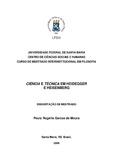| dc.creator | Moura, Paulo Rogerio Garcez de | |
| dc.date.accessioned | 2010-01-12 | |
| dc.date.available | 2010-01-12 | |
| dc.date.issued | 2009-09-11 | |
| dc.identifier.citation | MOURA, Paulo Rogerio Garcez de. Science and technique in Heidegger and Heisenberg. 2009. 115 f. Dissertação (Mestrado em Filosofia) - Universidade Federal de Santa Maria, Santa Maria, 2009. | por |
| dc.identifier.uri | http://repositorio.ufsm.br/handle/1/9082 | |
| dc.description.abstract | The classical physical science distinguishes itself as a previous project, consisting of the fundamental concepts of elements such as calculation, time, space, motion, matter, force and directed to capture all the nature phenomena supposedly unified. Quantum mechanics advances beyond these postulates, evidencing the inevitable interference of the subject in the search results , in
which a reference to an ontological theory with material objects should be able to capture for regularities calculation, it becomes impossible, leaving the core
concepts and field for the previous innovative project. As a result, the uncertainty principle that is expressed in a state of motion is identified only as to the statistical calculation or position, or the magnitude of the movement.
After the development the existential concept of science that emphasizes the being-there as being-in-the-world to find certain beings as objects by the previous project of the scientific perspective, Heidegger subsequently comes to the conclusion that quantum physics incorporating the
classical physics keeps unchangeable in terms of the previous science project of all: the nature disposes in advance a way of securing the meeting proposed by the existing human scientific achievement in theory terms . Science is only an access way to nature in its inexhaustible plenitude, so that it makes it unavoidable and unattainable with the scientificity resources. The com-position is the essence of the technique using scientific results and, by its vortex, enabling it to the final co-existing human. It remains to the being-there the
mercy of a thought as to question the destitute condition of his own danger in forgetting that the cooption may be victim of their own decision. | eng |
| dc.description.sponsorship | Fundação de Amparo a Pesquisa no Estado do Rio Grande do Sul | |
| dc.format | application/pdf | por |
| dc.language | por | por |
| dc.publisher | Universidade Federal de Santa Maria | por |
| dc.rights | Acesso Aberto | por |
| dc.subject | Ser-aí | por |
| dc.subject | Ciência | por |
| dc.subject | Técnica | por |
| dc.subject | Física quântica | por |
| dc.subject | Being-there science | eng |
| dc.subject | Technique | eng |
| dc.subject | Quantum physics | eng |
| dc.title | Ciência e técnica em Heidegger e Heisenberg | por |
| dc.title.alternative | Science and technique in Heidegger and Heisenberg | eng |
| dc.type | Dissertação | por |
| dc.description.resumo | A física clássica distingue-se como ciência por um projeto prévio, composto pelos conceitos fundamentais de elementos como cálculo, tempo, espaço, movimento, matéria, força e direcionado a captar todos os fenômenos da natureza supostamente unificada. A mecânica quântica avança além desses postulados, evidenciando a inevitável interferência do sujeito nos resultados de sua pesquisa, em que a referência a uma teoria ontológica com objetos materiais, devendo ser captáveis para fins de cálculo de regularidades, tornase
impossível, restando os conceitos de núcleo e campo para o projeto prévio inovador. Em decorrência, o princípio de incerteza se expressa em que um estado de movimento se identifica somente quanto à calculabilidade estatística
ou da posição, ou da grandeza do movimento. Após a elaboração do conceito existencial de ciência, que ressalta o seraí como ser-no-mundo a encontrar entes determinados como objetos pelo projeto prévio da perspectiva científica, Heidegger posteriormente chega à conclusão de que a física quântica incorporando a física clássica permanece
imutável no que concerne ao projeto prévio da ciência de sempre: a natureza se dispõe de antemão a um encontro ao modo de asseguramento proposto pelo existente humano numa realização científica em termos de teoria. A ciência permanece apenas como um dos modos de acesso à natureza em sua plenitude inesgotável, o que faz com que ela seja incontornável e inacessível com os recursos da cientificidade. A com-posição é a essência da técnica utilizando resultados científicos e, pela sua voragem, habilitando-se para a
cooptação definitiva do existente humano. Resta ao ser-aí a piedade de um pensamento indigente enquanto questionar a sua própria condição de perigo no esquecimento da cooptação de que pode ser vítima por própria decisão. | por |
| dc.contributor.advisor1 | Reis, Róbson Ramos dos | |
| dc.contributor.advisor1Lattes | http://lattes.cnpq.br/0127419824935492 | por |
| dc.contributor.advisor-co1 | Schneider, Paulo Rudi | |
| dc.contributor.advisor-co1Lattes | http://lattes.cnpq.br/2697187291647870 | por |
| dc.contributor.referee1 | Fabri, Marcelo | |
| dc.contributor.referee1Lattes | http://lattes.cnpq.br/9122803302644811 | por |
| dc.creator.Lattes | http://lattes.cnpq.br/9815585530252572 | por |
| dc.publisher.country | BR | por |
| dc.publisher.department | Filosofia | por |
| dc.publisher.initials | UFSM | por |
| dc.publisher.program | Programa de Pós-Graduação em Filosofia | por |
| dc.subject.cnpq | CNPQ::CIENCIAS HUMANAS::FILOSOFIA | por |


